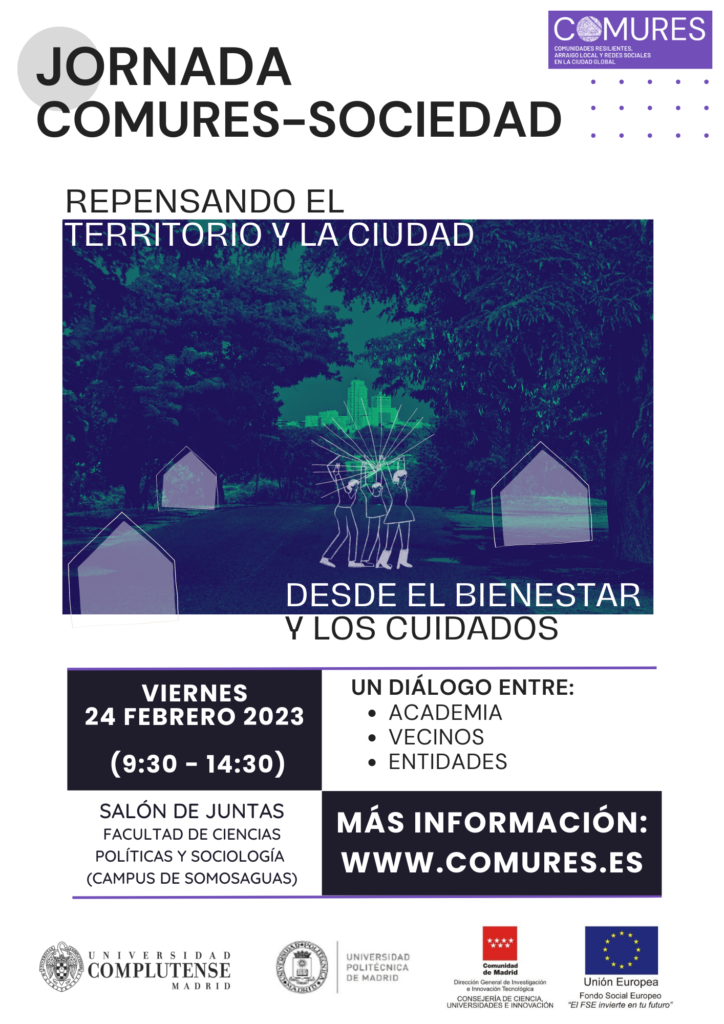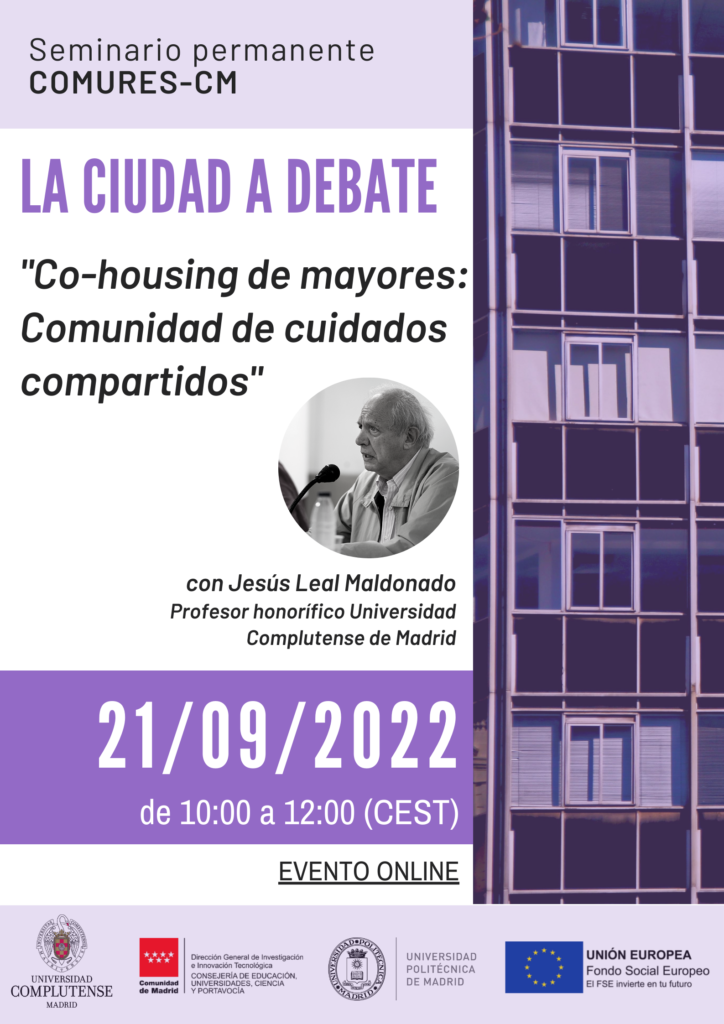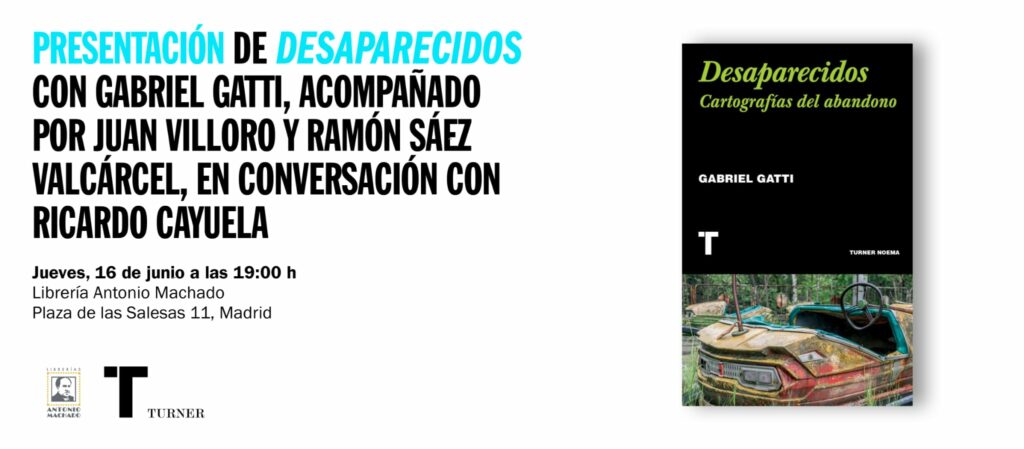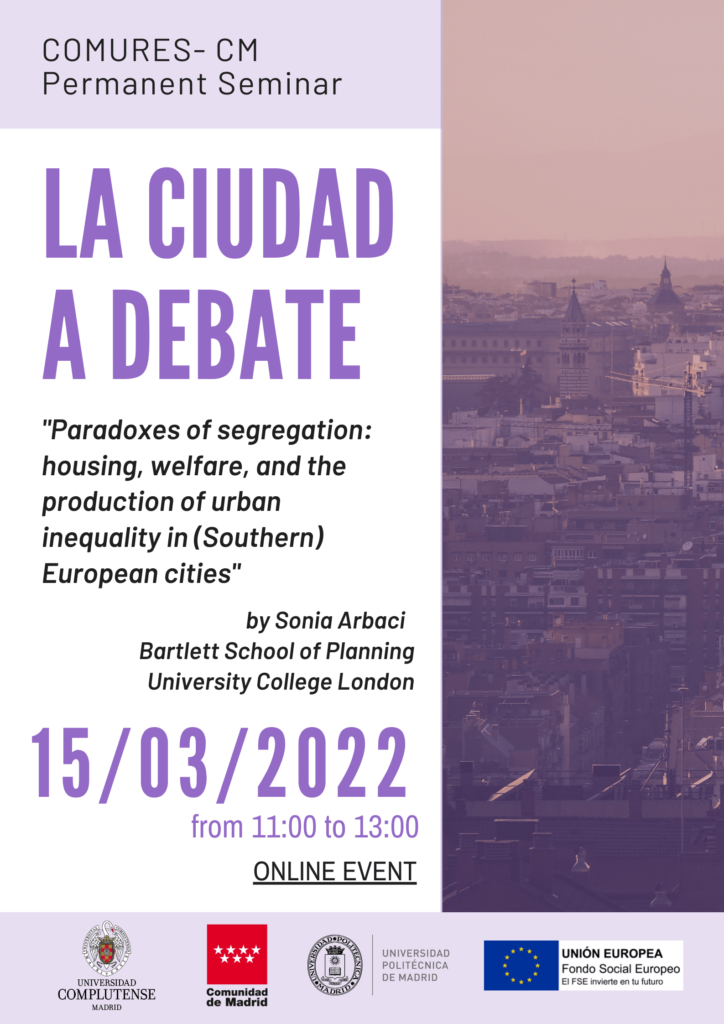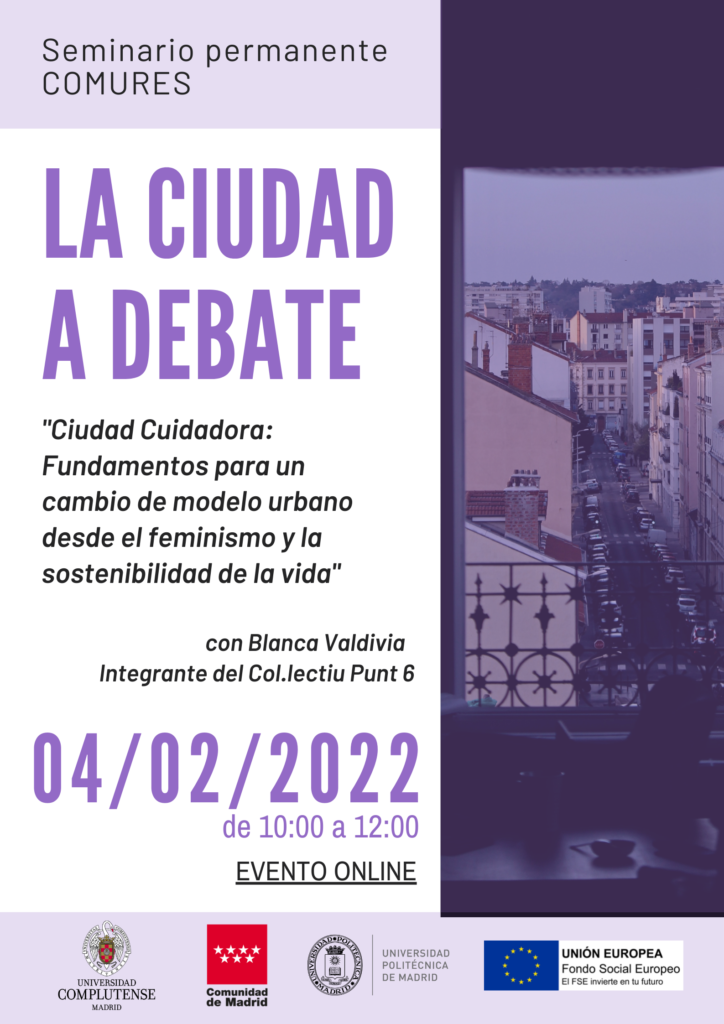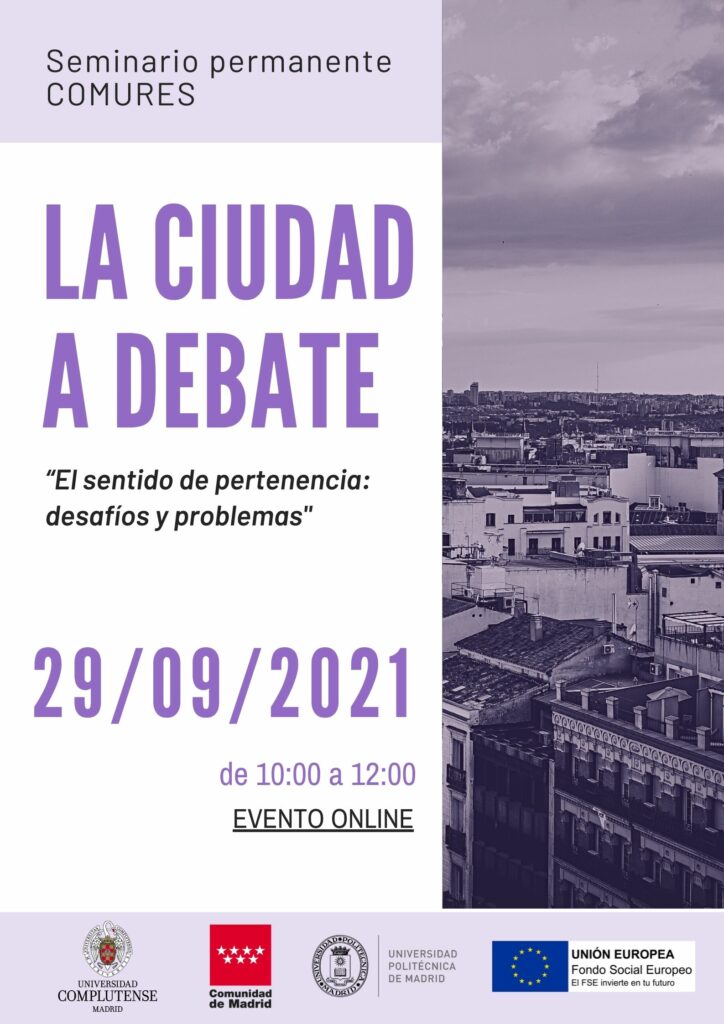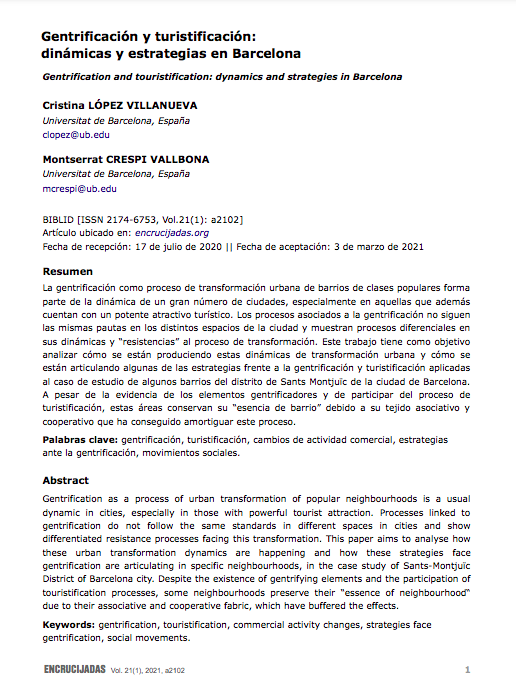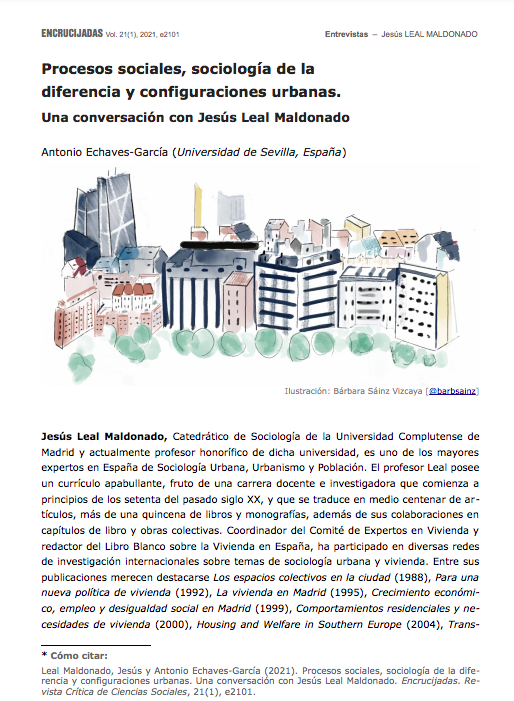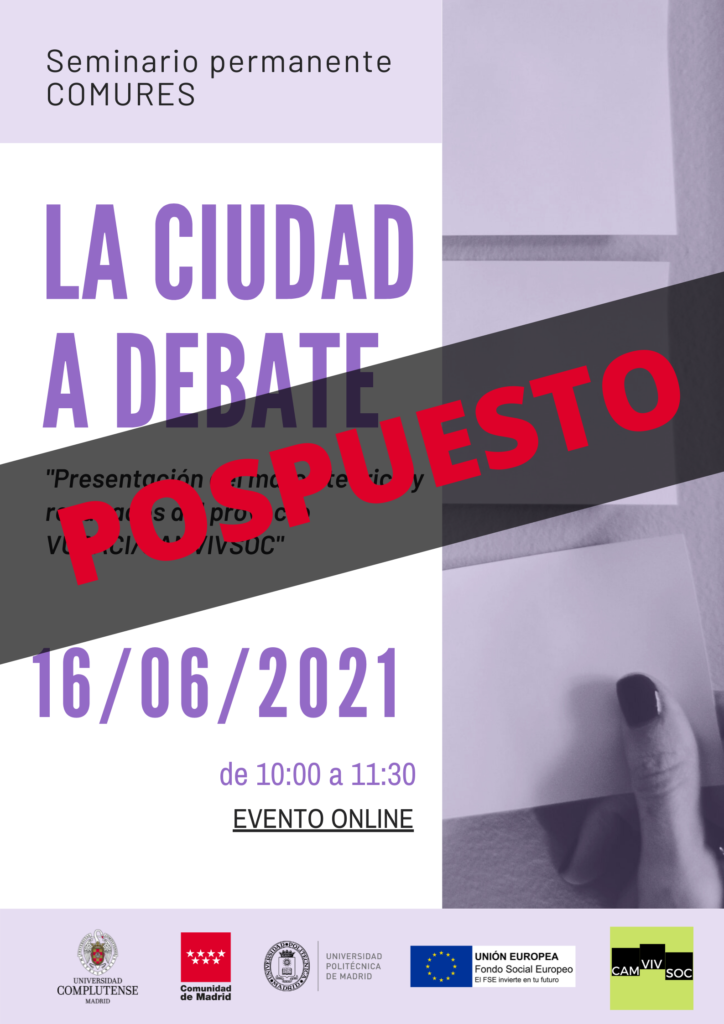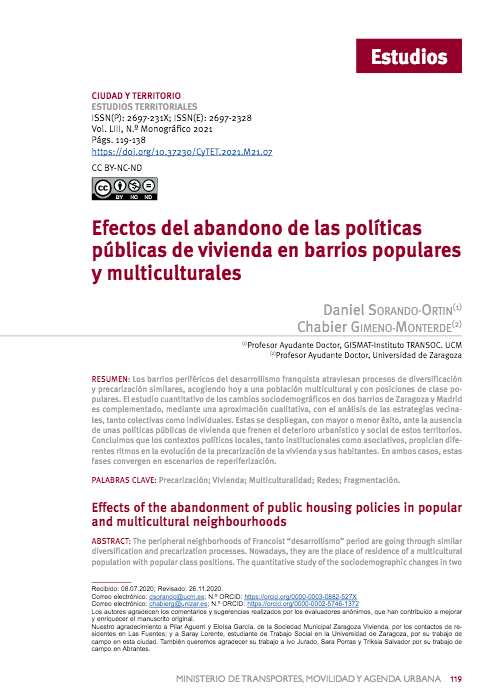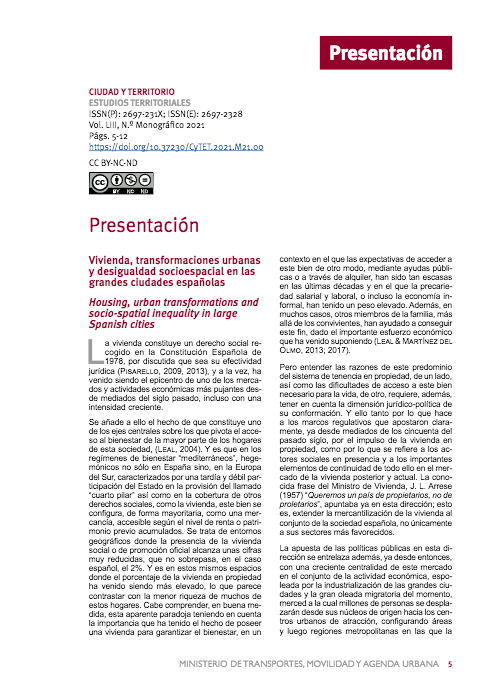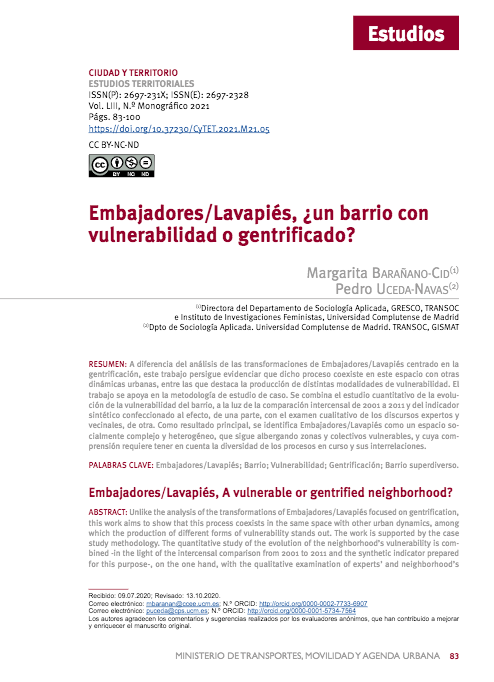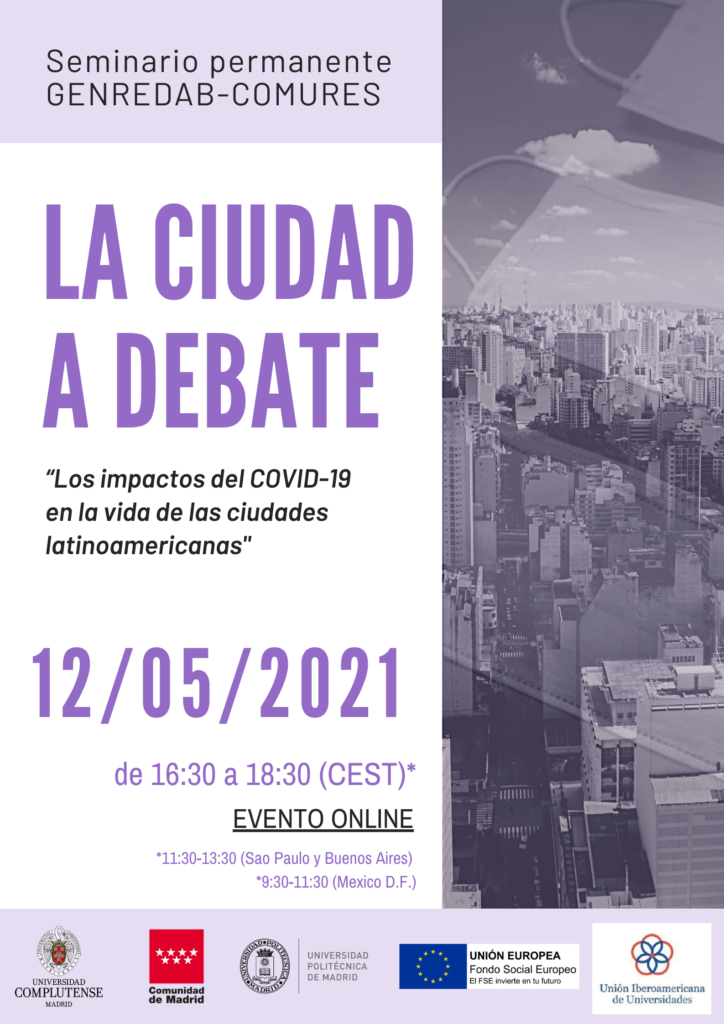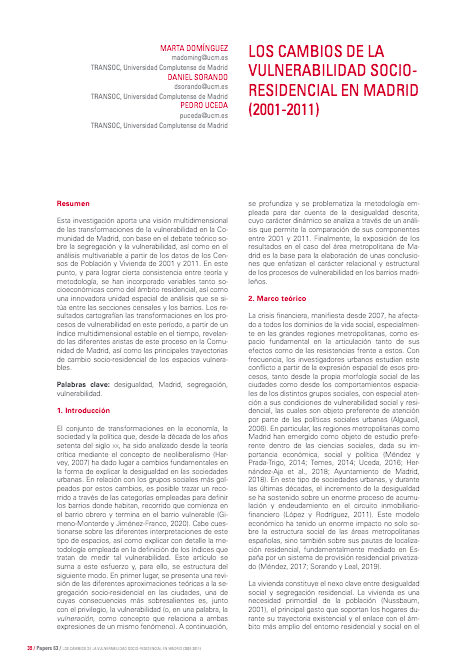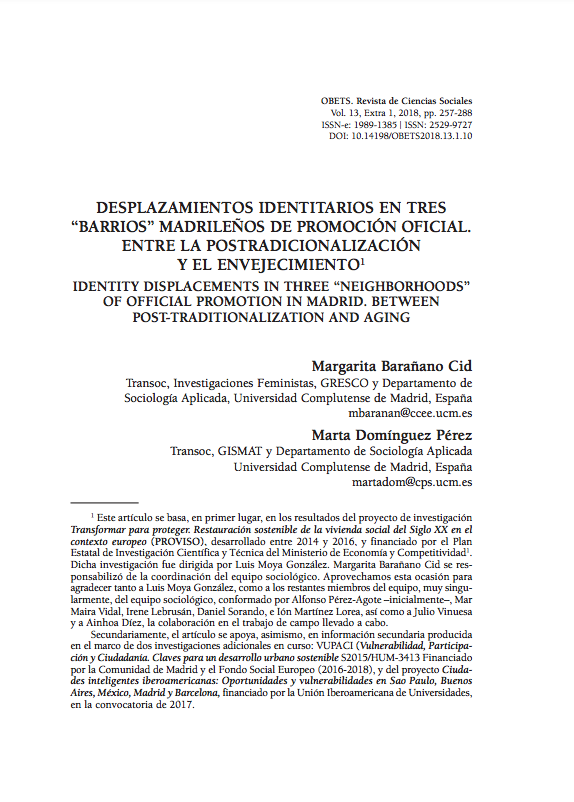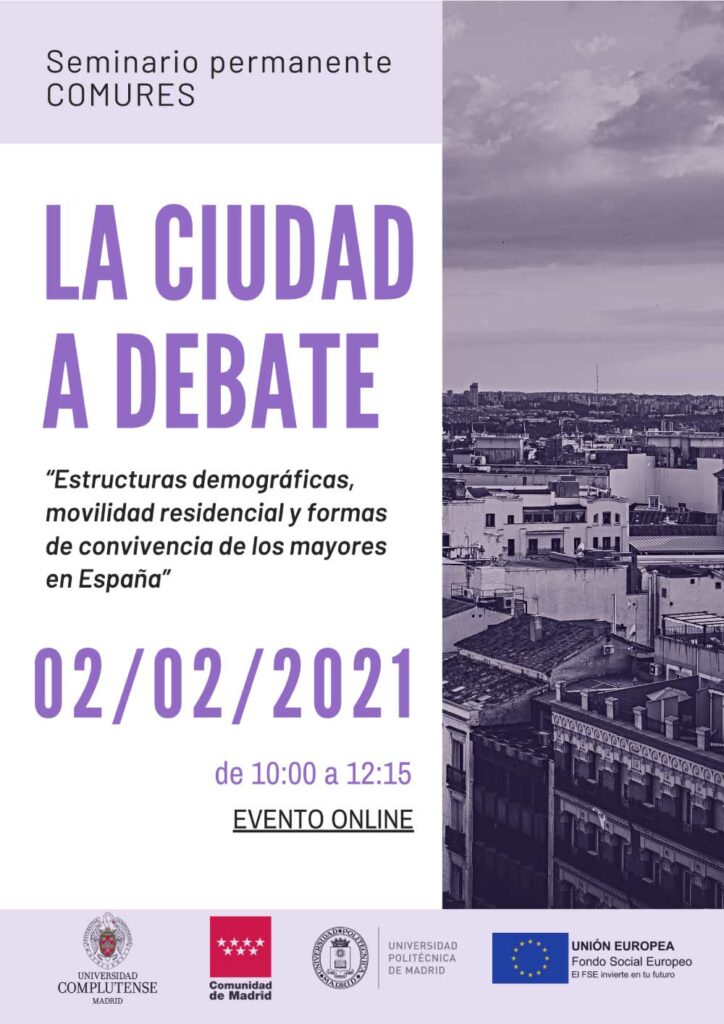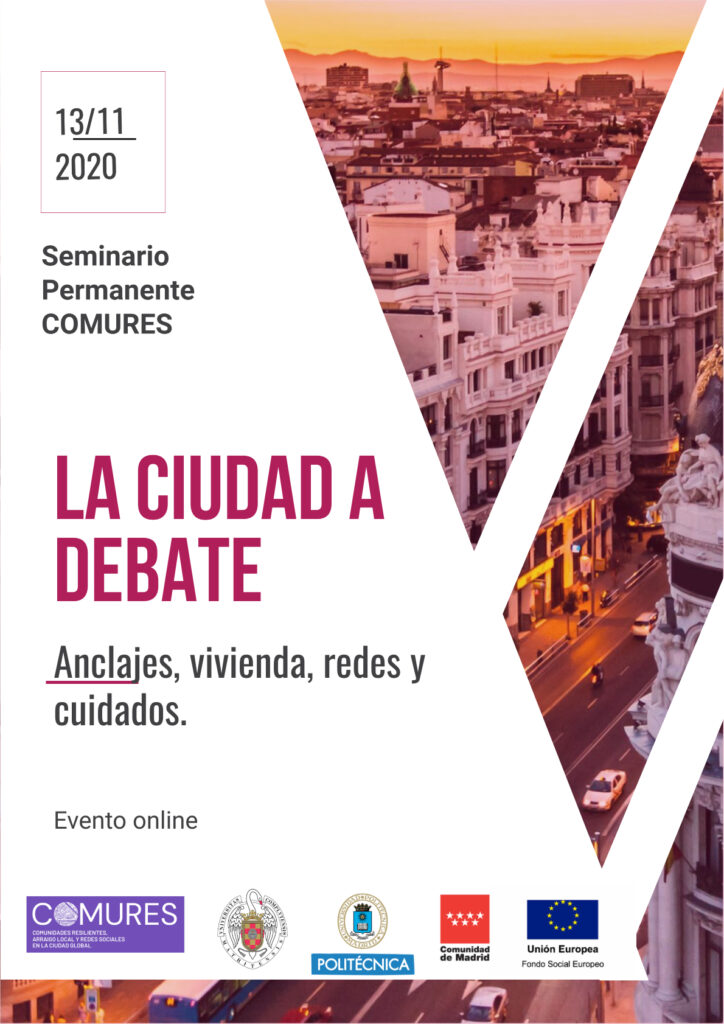Recent posts
Scroll down to explore the team's latest news and publications.
Make use of our tags to navigate:
Jornada COMURES-SOCIEDAD (24 de Febrero)
 José Ariza de la Cruz
José Ariza de la Cruz
 16 de February de 2023
16 de February de 2023
Seminario Permanente COMURES: La Ciudad a Debate – «Co-housing de mayores: Comunidad de cuidados compartidos»
 Paola Leenhouts
Paola Leenhouts
 23 de September de 2022
23 de September de 2022
COMURES-CM se estrena en Twitter
 José Ariza de la Cruz
José Ariza de la Cruz
 9 de September de 2022
9 de September de 2022
Presentación del libro «Desaparecidos. Cartografías del Abandono» por Gabriel Gatti
 José Ariza de la Cruz
José Ariza de la Cruz
 25 de May de 2022
25 de May de 2022
Seminario Permanente COMURES: La Ciudad a Debate – «Tensiones, límites y retos que plantean los cuidados en la comunidad»
 José Ariza de la Cruz
José Ariza de la Cruz
 23 de May de 2022
23 de May de 2022
Seminario Permanente COMURES: La Ciudad a Debate – «El sentido de pertenencia: desafíos y problemas»
 Paola Leenhouts
Paola Leenhouts
 29 de September de 2021
29 de September de 2021
Gentrificación y turistificación: dinámicas y estrategias en Barcelona
 Paola Leenhouts
Paola Leenhouts
 15 de June de 2021
15 de June de 2021
Procesos sociales, sociología de la diferencia y configuraciones urbanas. Una conversación con Jesús Leal Maldonado
 Paola Leenhouts
Paola Leenhouts
 15 de June de 2021
15 de June de 2021
Los hogares como espacios de arraigo y sus transformaciones en un contexto global
 Paola Leenhouts
Paola Leenhouts
 15 de June de 2021
15 de June de 2021
*** POSPUESTO el quinto Seminario Permanente de COMURES-CM – VUPACI – CAMVIVSOC
 Paola Leenhouts
Paola Leenhouts
 9 de June de 2021
9 de June de 2021
Efectos del abandono de las políticas públicas de vivienda en barrios populares y multiculturales
 Paola Leenhouts
Paola Leenhouts
 20 de May de 2021
20 de May de 2021
Vivienda, transformaciones urbanas y desigualdad socioespacial en las grandes ciudades españolas
 Paola Leenhouts
Paola Leenhouts
 20 de May de 2021
20 de May de 2021
Embajadores/Lavapiés, ¿un barrio con vulnerabilidad o gentrificado?
 Paola Leenhouts
Paola Leenhouts
 19 de May de 2021
19 de May de 2021
Territorio, lugar e identidad en los barrios vulnerables. El Barrionalismo como práctica política.
 Paola Leenhouts
Paola Leenhouts
 19 de May de 2021
19 de May de 2021
Seminario Permanente COMURES: La Ciudad a Debate – «Soy porque somos: cuidados e interdependencias en un mundo vulnerable»
 Paola Leenhouts
Paola Leenhouts
 15 de April de 2021
15 de April de 2021
Los Cambios de la Vulnerabilidad Socio-Residencial en Madrid (2001-2011)
 Paola Leenhouts
Paola Leenhouts
 8 de April de 2021
8 de April de 2021
Desplazamientos Identitarios en Tres «Barrios» Madrileños de Promoción Oficial. Entre la Postradicionalización y el Envejecimiento.
 Paola Leenhouts
Paola Leenhouts
 1 de April de 2021
1 de April de 2021
Seminario Permanente COMURES: La Ciudad a Debate – “Anclajes, vivienda, redes y cuidados”
 admin
admin
 15 de November de 2020
15 de November de 2020
Sesión de diseño metodológico – GRESCO-COMURES
 José Ariza de la Cruz
José Ariza de la Cruz
 12 de November de 2020
12 de November de 2020
What do we analyze in COMURES?
Moorings
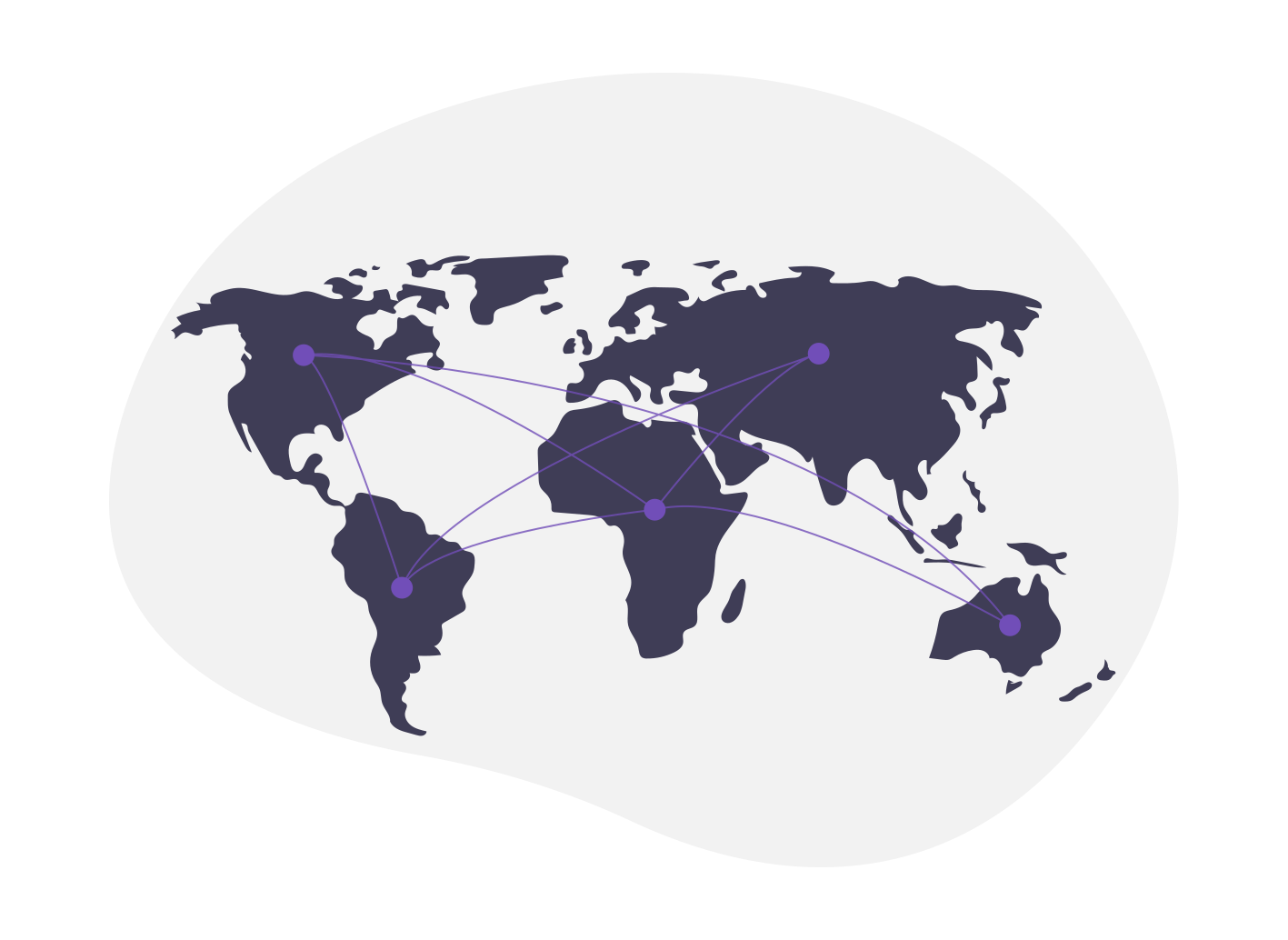
Social reproduction and care

Displacement processes and care
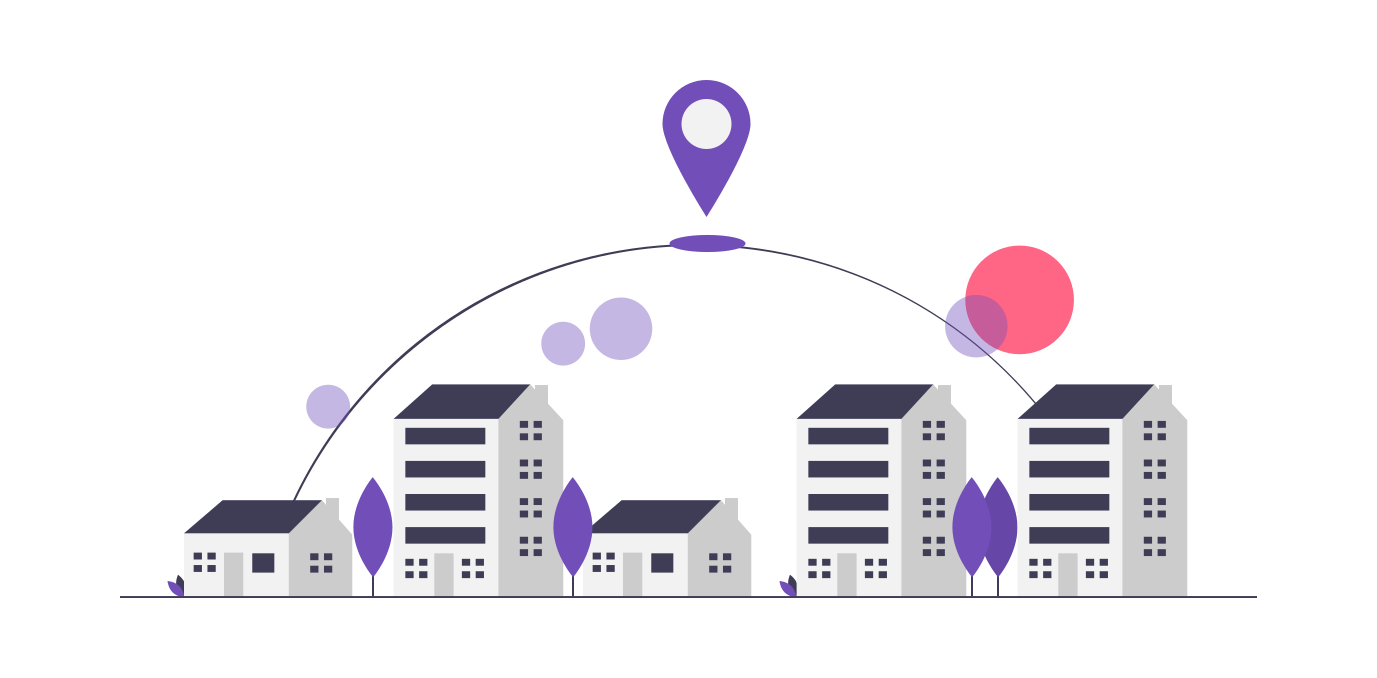
Impacts of COVID-19

We argue that despite the relevance, breadth and complexity of mobilities in a global context , spatial moorings still hold a prominent role in the context the social Southern Europe and iberoamerican cities, which have not been disrupted or dissolved during this period of COVID-19 and may have been even reinforced.
That, in turn, these moorings have a very important role to play in the ways in which life is conducted, in the social reproduction of lifeand, more so in terms of domestic work and care, welfare regimes and care in Iberoamerican cities, in contrast to those in other geographical settings, where the role of public administrations or the market (hiring help for domestic or care work) would be larger.
It also aims to study how different processes which have resulted in growing displacement especially in city centers, but also in many other areas of the city, may have had an important role in producing, a greater and more negative impact on the access to welfare and care of these people ,due to the prominent role of spatial moorings and social networks rooted in this type of cities
Finally, in the present context, it is necessary to refer to the those changes derived from the sanitary crisis derived from COVID-19and in what direction the crisis has impacted on the subject under study, considering, in general, the arrangements for getting on with life, and, more specifically, in relation to domestic work and the care of dependants, the elderly and children.
Research teams
The work of three different research teams is coordinated under COMURES: GRESCO, GISMAT and LoCUS.

GRESCO The Socio-cultural Contemporary Studies Group (in Spanish Grupo de Estudios Socio-culturales Contemporáneos) research group from the Universidad Complutense de Madrid that began its activity in the mid-1990s. Its purpose is mainly focused on carrying out research, although it has an important learning and teaching orientation that has allowed young teachers and researchers to be trained, contributing to the generation and renewal of knowledge in the social sciences. Its main lines of research are:
- Socio-cultural transformations: individualization, secularization and changes in the university model.
- Work, employment and business in a changing world.
- Social theory, globalization, transnationalism and spatial reconfigurations of social life.
- Body, health and gender.
- Vulnerability and social inequality.

The GISMAT research group of the Complutense University of Madrid (UCM), belongs to the global change and new energies cluster, as well as to the cultural heritage cluster. The team is composed of sociologists with extensive experience in the field of study that gives the group its title (environment, territory, housing, vulnerability, social cohesion, etc.) and has developed over recent years an intense research on housing issues that have resulted in numerous publications and multiple interventions that can be seen in the curricula of its members.

LoCUS is formed by a multidisciplinary team of experts in urban planning, architecture, engineering and GIS to cover the urban complexity in its multiple dimensions. Most of its members carry out their research and teaching activities at the Escuela Superior de Arquitectura de Madrid (Madrid School of Architecture in English;ETSAM-UPM), the Fundación Miguel Aguiló from the Technical School of civil engineering of the Polytechnic University (ETSICCP-UPM), and other architecture schools relevant in the international scene; such as the one in Birmingham and the IUAV of Venice.
Contact form
Please, fill in the following contact form with your questions, suggestions or in case you need to contact any of our researchers.
CONTACT DETAILS
(+34) 913 942 442
info@comures.es
Faculty of Political Science and Sociology
Campus de Somosaguas, s/n, 28223
Pozuelo de Alarcón, Madrid
TEAM'S SCHEDULE
| Lunes – Viernes | 9:00 – 17:00 |



